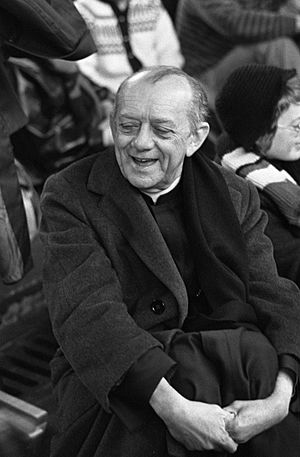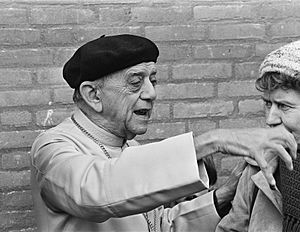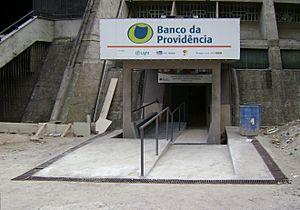Hélder Câmara facts for kids
Quick facts for kids Servant of God Hélder Câmara OFS |
|
|---|---|
| Archbishop-Emeritus of Olinda e Recife | |
 |
|
| See | Olinda e Recife (Emeritus) |
| Enthroned | 12 March 1964 |
| Reign ended | 2 April 1985 |
| Predecessor | Carlos Gouveia Coelho |
| Successor | José Cardoso Sobrinho |
| Orders | |
| Ordination | 1931 |
| Consecration | 20 April 1952 by Jaime de Barros Câmara |
| Personal details | |
| Birth name | Hélder Pessoa Câmara |
| Born | 7 February 1909 Fortaleza, Brazil |
| Died | 27 August 1999 (aged 90) Recife, Brazil |
| Buried | Holy Saviour of the World Cathedral, Olinda |
| Denomination | Roman Catholic |
| Motto | In manus tuas (into your hands) |
| Coat of arms |  |
Hélder Pessoa Câmara (born February 7, 1909 – died August 27, 1999) was a Brazilian Catholic archbishop. He was known for helping people and fighting for human rights. He served as the Archbishop of Olinda and Recife from 1964 to 1985. This was a time when Brazil was under a military dictatorship. Câmara was declared a Servant of God in 2015, which is the first step towards becoming a saint in the Catholic Church.
He believed in a special way of thinking called liberation theology. This idea suggests that the Church should work to free people from poverty and unfairness. Câmara worked hard for the poor and for human rights and democracy during the military rule. He wanted the Church to be closer to people who were struggling. He famously said, "When I give food to the poor, they call me a saint. When I ask why they are poor, they call me a communist."
Contents
Early Life and Education
Hélder Pessoa Câmara was born in Fortaleza, Ceará, Brazil. This area is known as the poor Northeast Region. His father was an accountant, and his mother was a primary school teacher. He went to local Catholic schools. In 1923, he began studying to become a priest at a seminary.
Career as a Priest and Bishop
Câmara became a priest in 1931, even though he was younger than usual. In 1952, Pope Pius XII made him an auxiliary bishop in Rio de Janeiro. Early in his career, he supported a far-right political group in Brazil, but he later changed his views and rejected those ideas. He also started two groups to help people: the Ceará Legion of Work in 1931 and the Women Workers' Catholic Union in 1933.
On March 12, 1964, Pope Paul VI appointed him Archbishop of Olinda e Recife. During his time as archbishop, people often called him the "bishop of the slums." This was because he clearly supported poor people in cities. He encouraged farmers to learn from the gospels and work for social change.
Câmara helped create the Brazilian Bishops’ Conference in 1952. He was its first general secretary until 1964. In 1959, he started the Banco da Providência in Rio de Janeiro. This organization helped fight poverty by making it easier for poor people to get loans.
Working for Change
Câmara attended all four meetings of the Second Vatican Council. This was a very important meeting for the Catholic Church. He helped write a document called Gaudium et spes, which talked about the Church in the modern world. In 1965, Câmara and 40 other bishops signed a document called the Pact of the Catacombs. They promised to live simply, without fancy titles or wealth. They believed bishops should serve the poor and be open to everyone, no matter their beliefs.
Under Câmara's leadership, the Catholic Church in Brazil became a strong voice against the military dictatorship (1964–1985). The Church became a powerful force for social change. Câmara spoke out against violence used to stop people from protesting poverty. Some traditional Catholics even wanted the government to arrest him because he supported land reform.
Câmara was a big supporter of liberation theology. This idea connects the Church's charity work with political action. He published a book called Spiral of Violence in 1971. In this book, he explained how unfair systems (Level 1 violence) can lead to rebellion (Level 2 violence) and then to harsh reactions from those in power (Level 3 violence). He asked young people to help break this cycle of violence.
He passed away in Recife on August 27, 1999, at the age of 90.
His Beliefs
Câmara believed that spouses who were left by their partners should be allowed to remarry in the Church. He also said that while he supported non-violence, he understood why some people might use force against oppressors. He stated, "I respect a lot priests with rifles on their shoulders; I never said that to use weapons against an oppressor is immoral or anti-Christian. But that's not my choice, not my road, not my way to apply the Gospels."
He called himself a socialist, but not a Marxist. He explained that his socialism was special. He said, "My socialism is special, it's a socialism that respects the human person and goes back to the Gospels. My socialism is justice." He agreed with some of Marx's ideas about how capitalist societies work, even if he didn't agree with all of Marx's conclusions.
Legacy and Awards
- In 1973, Câmara was nominated for the Nobel Peace Prize. However, some people on the Nobel Committee, working with the Brazilian government, tried to stop him from getting the award. The military government in Brazil was strongly against him.
- In 1975, he received the Pacem in Terris Award. This award is named after a letter from Pope John XXIII called Pacem in terris, which means "Peace on Earth." The letter asks all people to work for peace among nations.
Path to Sainthood
On February 15, 2015, the Archbishop of Olinda and Recife, Antônio Fernando Saburido, asked the Vatican to start the process for Câmara to become a saint. The Vatican agreed quickly. On April 7, 2015, Câmara was given the title of Servant of God. This is the first official step in the process of beatification and canonization (becoming a saint). The official start of this process took place on May 3 at Olinda Cathedral.
The Anglican Episcopal Church of Brazil already recognizes Câmara as a saint. They celebrate his feast day on August 27.
See also
 In Spanish: Hélder Câmara para niños
In Spanish: Hélder Câmara para niños
- List of peace activists
- Streetwise priest



